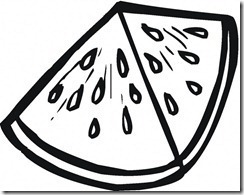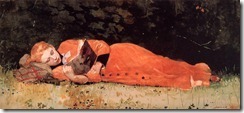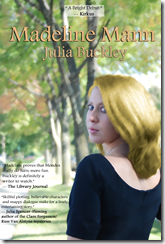Riley Adams's Blog, page 221
November 24, 2010
Getting Some Distance from Our Words
 We're having some painting done inside our house. Years of children with sticky hands have taken their toll on our walls. :)
We're having some painting done inside our house. Years of children with sticky hands have taken their toll on our walls. :)
While the painters were here, the owner said to me, "Would you like us to do your front door and shutters, too?"
I frowned. "Why? Do you think they should be painted?"
He hesitated. "Well, what color do you think they are?"
"I think the shutters and door are black."
"Could you step outside with me for a minute?" he asked.
As he pointed out, and as I was surprised to see, the shutters and door had faded quite a bit in the sun. They used to be black—but now were varying shades of grayish-black.
He painted them yesterday and the house looks brand-new. But I never would have noticed that they needed to be done because I drive up to my house every single day. I don't even see it anymore.
You see this analogy coming. :) It's true, though—we get just as close to our manuscript. It can be really tough to see its problems when we've been reading the book every day.
First readers or an independent editor are obvious solutions to this problem. They will read our work with fresh eyes and the problems will pop out at them easier.
Unfortunately, some of us may not have first readers to help us out. I've had a couple of writers volunteer to read for me, but because I have more than one project going on at once, I tend to get right up on top of my deadline. I just don't feel comfortable asking anyone to drop everything in their life to read 280 pages in a few days' time. Oh—except I do ask it of my mother. :)
So what's the solution if we need to get some distance from our work to thoroughly edit it?
Time: You can put your manuscript down for as much time as possible, then return to it. This method does work, although I don't have the time to do it anymore. When you pick up your manuscript again, it's almost as if someone else wrote it.
Reading aloud: This is a method that I use and it does help. There are only so many pages I can read without going hoarse, but the reading does put a bit of distance between us and the work.
Change of scenery: I really don't know why this works, but it does. If I've written the majority of the book at home, then I'll go to the coffeehouse to edit it. Different setting, different task at hand? Whatever it is, it seems to work for me…I think my brain is easily tricked. :)
Different font: I've heard this trick before, but haven't used it. Some swear by putting your manuscript in a completely different font for editing.
How do you get distance from your words?
November 23, 2010
Watermelon and Seed
 I was volunteering in my daughter's classroom on Friday for a Thanksgiving party for 4th grade.
I was volunteering in my daughter's classroom on Friday for a Thanksgiving party for 4th grade.
While I was in there (supposedly setting out snack supplies so the kids could make their own teepees out of ice cream cones, chocolate, and hard candy), I couldn't help but look at all the writing-related posters on the wall.
Fourth grade is a big writing year in elementary school. There were posters covering punctuation mechanics, grammar rules, commonly misspelled words, etc.
There was one poster though, that was a little more interesting to me. "Is your story idea a watermelon or a seed?"
Kids, naturally, sometimes come up with big ideas for stories—that don't really work for a short writing assignment. "My Summer Vacation" instead of "The Worst Amusement Park Visit Ever!" The teacher's point was that they needed to narrow their focus to get a better story.
But novelists are working with more pages to fill. We can afford a bigger picture.
Sometimes, though, that big picture doesn't always work. I've definitely read books where I felt lost in the imaginary world the author had created. What was the primary plot? What character am I supposed to care about…and who is the protagonist? These books felt unfocused and rambling. What was the point? Was it a murder mystery or a family saga or lit fic with an agenda? What was the seed?
With genre fiction, the seed is pretty easy to find. The underlying thread of my books is a murder. And I don't need to get too far away from it or else I'm off-target.
I've definitely edited down books before to get to the seed. Maybe there's a subplot that's fun, but doesn't really tie in enough with the main story—maybe it's an idea that needs its own book instead of being squeezed into a subplot. Or maybe there's a secondary character that's stealing the show and needs his own book.
Have you read books that don't have a sharp enough focus? How do you winnow your plot down to the seed when you write?
November 21, 2010
Why We Write
 My 8th grade son has really enjoyed his Language Arts class (what the schools are calling English these days) the last couple of years. His teacher actually moved up from 7th grade to 8th grade and he's having her for a second year.
My 8th grade son has really enjoyed his Language Arts class (what the schools are calling English these days) the last couple of years. His teacher actually moved up from 7th grade to 8th grade and he's having her for a second year.
I've been impressed with the way the teacher has taught topics like mood and tone and the quality of the assignments she sends home for projects. I feel like he's getting a really solid background in a subject that's important to me.
He does have a new assignment, though, that's got me puzzled. To be fair, it hasn't actually come from the Language Arts teacher that he and I like so much—it's a school-wide, quarterly book project and is supposed to supplement his other curriculum.
For the assignment, he's to take the books he's reading for pleasure and do a comprehensive project on them. So, not the books that he's reading for class---books he's reading for fun.
Commercial fiction. Genre fiction. For him, this is Sci-fi, fantasy, dystopian literature, etc…and do a project.
Fine. But one of the questions on the assignment is "what was the author's purpose in writing this book?"
My immediate reaction was to snort. For commercial fiction? That purpose is personal to the author. It could be because they can't NOT write. It could be that they've studied the market and studied the craft and written a book that they thought could sell…to break into a difficult and crowded market. It could be for money. It could be that they dreamed up a character that demanded to have a story written around them.
But almost always? It's to entertain. It's probably not to inform or educate. It's to provide a reader a few hours of escape. It's been carefully thought-out and designed and revised and sweated over to seem seamless and to be riveting.
Why do you write?
November 20, 2010
Twitterific
Here are writing links that I've posted to Twitter for the past week.
If you're looking for a particular topic, just plug in your keyword into the search box at the top left-hand corner of the blog (on the black header right above my blog name…next to the Blogger symbol…the small search window is next to the magnifying glass) and the roundup with your subject will come up. To narrow your search down on the page, do a CTRL+F, type your subject, and hit enter.
For crime writers--handling lengthy investigations in our fiction: http://dld.bz/7usF @mkinberg
Why fairy tales are immortal (Globe and Mail) : http://dld.bz/7ugZ
Making Sense of a Rejection Letter: http://dld.bz/7rmj
5 Tips For Choosing The Perfect Book Interior Designer: http://dld.bz/7rmd @thecreativepenn
Understanding Advances And Royalties: http://dld.bz/7rk7
Things that have surprised me about the writing life: http://dld.bz/7tgH
Publishing -- The Synopsis: http://dld.bz/7rk5
Thanksgiving Mysteries: 2010 List: http://tinyurl.com/2g96waz @JanetRudolph
How to Make Your Website Mobile Friendly (And Keep Your Readers Happy): http://dld.bz/7rk2
Writing Cannot Be Strictly An Independent Activity: http://dld.bz/7rkb
A tale of a successful query: http://dld.bz/7rjS
For God's Sake, Buy Your Friends' Books: http://dld.bz/7rxY
When Writing Doesn't Pay (And It Feels Great): http://dld.bz/7rhb
Myst. Lov. Kitchen: Hot Seafood Dip http://bit.ly/aFeFNI @CleoCoyle
Bloggers: How to Slash your Writing Time in Half: http://dld.bz/7gmx
3 Steps to Fan Page Awesomeness: http://dld.bz/7gkX
Tips on Writing Action Scenes: http://dld.bz/7gkU
Agent Donald Maass On: Your Tools for Character Building: http://dld.bz/7gdc
How to Use WordPress as an Online Notebook: http://dld.bz/7gcH
Keep the Passion to Write: http://dld.bz/7dnM
"Should I Quit My Job to Work as a Writer for Hire?" http://dld.bz/7dns
6 Tips for Writing for Young Adults: http://dld.bz/7dnd
13 Tips for Beginning Bloggers (Which One Blogger Learned the Hard Way): http://dld.bz/7dmP
Writing Should Be Treated as a Business: http://dld.bz/7dmJ
How to write a Q&A: http://dld.bz/7dmD
Get Past a Motivational Brick Wall: http://dld.bz/7dmh
Writing the synopsis before the book: http://dld.bz/7dkR
Should You Include Illustration Notes in Your Picture Book? http://dld.bz/7dkM
Writing Devices: Transitions: http://dld.bz/7dkB
Stop and Go Sentences: http://dld.bz/7dkx
Can An Online Presence Help Make a Best Seller? http://dld.bz/7dkf
Working as a Copywriter Abroad: http://dld.bz/7dkb
Six Ways to Trick Yourself into Working Harder: http://dld.bz/7fRJ
Nicolas Gary: France's Digital Man of Letters: http://dld.bz/7dj5
Myst. Lov. Kitchen: Pumpkin Pie! http://bit.ly/d53M1Z @CleoCoyle
The Most Sympathetic Villain Ever: http://dld.bz/7djx
Literary rejections on display: http://dld.bz/7aXg
The Dark Side Of Your Novel's Hero: http://dld.bz/7aWV
Negotiating your own contract: http://dld.bz/7dnS
How to Connect and Network With Writers – 5 Social Media Tips: http://dld.bz/7aWK
Steampunk Abstractions: The Inevitability of Imperialism: http://dld.bz/7aW5
4 Agent Pet Peeves: http://dld.bz/7aWr
The Cons of Procrastination: http://dld.bz/7aWk
Writing Through the Doubt: http://dld.bz/7aVF
Starting a Scene with Dialogue: http://dld.bz/7aVv
Should You Grant an Exclusive Read to an Agent? http://dld.bz/7aVj
7 tips for improving your writing (especially for bloggers and freelancers): http://dld.bz/69N8
Seven Tips to Start Your Travel Blogging Journey: http://dld.bz/69Nv
Novels – Sagging Middle Fixes: http://dld.bz/69MA
How to Gain Twitter Influence: http://dld.bz/69Mz
Lock up the darn writer: http://dld.bz/69K2
12 Dozen Places To Self-Educate Yourself Online: http://dld.bz/69Ky
Top 5 Query Mistakes Freelance Writers Make: http://dld.bz/69Kp
How to speak publisher - A is for Acquisitions: http://dld.bz/69Kc
Myst. Lov. Kitchen: Thanksgiving Treats http://bit.ly/c4Q2Zb @CleoCoyle
How to Write for Translation: http://dld.bz/69JM
17 ways for writers to publish their content: http://dld.bz/69J7
The importance of first impressions: http://dld.bz/6SZR @joanswan
How to Write Safely in a Publishing Universe: http://dld.bz/69Jh
How to Salvage a Scene: http://dld.bz/69Hp
Thanks to the Writing Masquerade blog for interviewing me: http://dld.bz/6USZ ! I shared my recipe for corn pudding, too. :) @eveningfades
6 Articles for a Stronger, Faster, Better First Draft: http://dld.bz/6UCE @Writeitsideways
How To Write Three Blog Posts A Day: http://dld.bz/69Hg
9 tips for writing back cover copy: http://dld.bz/6UAT @TheCreativePenn
How to Unblock Your Writing and Create Effortless Words: http://dld.bz/69Hd
Building an Author Platform from Scratch: http://dld.bz/69GV @pubperspectives
This Is Your Brain on Metaphors (NY Times): http://dld.bz/69G4
Developing contacts to promote your book: http://dld.bz/6Tfg @spunkonastick
How to write a profile article: http://dld.bz/69F4
6 Vital Signs of A Healthy Plot: http://bit.ly/dgD3PK
The value of pre-publication blurbs: http://dld.bz/69Fr
iPhone Apps for NaNoWriMo: http://dld.bz/69Fd
Tips for having a blog tour: http://dld.bz/69Fa
Things one writer didn't expect about writing full-time: http://dld.bz/69EF
Book rejection bingo: http://dld.bz/69EB
Cultivating your Imagination: http://dld.bz/69Er @jammer0501
Five Steps to a Strong Main Character: http://dld.bz/69Ed
Checking for plot holes: http://dld.bz/69Ea
Inspiring the uninspired: http://dld.bz/69DR
3 blogging blunders: http://dld.bz/69DM
A reader asks:is Our Attention Span Getting Shorter? http://dld.bz/6z9M
Do You Even NEED an Agent?: http://dld.bz/69DB
Myst. Lov. Kitchen: Thanksgiving With a Little South on the Side http://bit.ly/bEcpv9 @CleoCoyle
Using flow for writing productivity: http://dld.bz/69Dw
How to Make Down Days Work for You: http://dld.bz/6zAp
Is Our Attention Span Getting Shorter? http://dld.bz/6z9M
Anatomy of a Scene Cut: http://dld.bz/6z9D
A Hidden Market for Freelance Writers: http://dld.bz/6z93
Writers: Be Bold! http://dld.bz/6z9f
How to Set Up Your First Blog the Right Way the First Time: http://dld.bz/6z9d
For freelancers: Ten Good Reasons the Editor Said "No": http://dld.bz/6z8M
Want to Be a Professional Writer? Act Like One. http://dld.bz/6z8C
Why modern books are all too long (Guardian): http://dld.bz/6z85
Writing the flip side of our characters: http://dld.bz/6GHx
The 7 Rules Part III: Rejection: http://dld.bz/6z82
The 3 types of negative book reviews: http://dld.bz/6z8u
5 Steps for Crafting the Perfect Book Review Pitch: http://dld.bz/6z8m
The Writer's Bucket List: http://dld.bz/6z8f
How to Keep the Conversations on Your Blog Civil: http://dld.bz/6z8a
Researching believability: http://dld.bz/6z7Q
5 Tips for Writing Scenes: http://dld.bz/56B2
One easy way to improve your writing--be specific: http://dld.bz/6DgJ @Paize_Fiddler
An agent with some Twitter tips: http://dld.bz/6z7A
The power of perspective: http://dld.bz/6z7y
Take the Fantasy Novelist's Exam: http://dld.bz/6z6P
Myst. Lov. Kitchen: COMMENT TO WIN TODAY! What is Your Must-Have Thanksgiving Side Dish? http://bit.ly/9jR5pW @CleoCoyle
Character Traits vs Author Traits - Reaching for the Brass Ring: http://dld.bz/6z6B
Why are you writing this story? http://dld.bz/6z6c
Why good guys need to win in detective novels (Boston Globe): http://dld.bz/6z5Z
Biographers fear that publishers have lost their appetite for serious subjects (Guardian): http://dld.bz/6z5M
5 Ways To Tell Your WIP Is Progressing: http://dld.bz/6t47
9 Ways To Elevate Your Speaking To Black Belt Level: http://dld.bz/6t45
Don't Prejudge Editorial Taste When Submitting to Magazines: http://dld.bz/6t42
Best Tweets for Writers (week ending 11/12/10): http://dld.bz/69NK
Things that authors get wrong: http://dld.bz/6t4f
Modifiers to avoid: http://dld.bz/6t3Q
Pleasing Ourselves or Pleasing the Reader? http://dld.bz/6t3K
Avoid 5 Plotting Mistakes by Using Scenes: http://dld.bz/6t34
Multiple Points of View: http://dld.bz/6t2t
Bad Boy Heroes: Three Types: http://dld.bz/6t2q
Top Five Mistakes that New Freelance Writers Make: http://dld.bz/6tzT
An Agent on Addressing Your Query: http://dld.bz/6tzv
5 Reasons Writers Get Stuck with Tips How to Unstick: http://dld.bz/6tzn
Ethnicity in writing--should you worry about including it? http://dld.bz/6475
A look at ending our scenes: http://dld.bz/6tzg
Archetypes, not Stereotypes: http://dld.bz/6tyy
Finding the Writing Groove: http://dld.bz/6tyr
5 Causes and Solutions to Writer's Block: http://dld.bz/6tyd
Myst. Lov. Kitchen: First Murder Bourbon Pecan Pie http://bit.ly/bblVwk @CleoCoyle
Ten of the best angels in literature (Guardian): http://dld.bz/6txX
An editor on backstory: http://dld.bz/6txM
Character Emotional Development: http://dld.bz/6txE
Definitive list of cliched dialogue: http://dld.bz/6txB
An agent on whether a writer should resubmit a manuscript, even if only one chapter is changed: http://dld.bz/6tx6
The online graphical dictionary: http://dld.bz/6sTQ
Twitterific--the week in tweets: http://bit.ly/cwFKYM
Business Writing Jobs and Rates – How Much Do Writers Make? http://dld.bz/6sTH
Taking history: top writers select their photographs of the decade: http://dld.bz/6sT9
An agent answers whether it's all right to scream or squeal when you get 'the call': http://dld.bz/6s6F
The New Girls' Network: How a debut author got a little help (PW): http://dld.bz/6s64
Feed your writing soul: http://dld.bz/6s6x
Events not worthy of a full screen: http://dld.bz/6s6u
5 More Ways to Jump Start a Writing Career - Part 2: http://dld.bz/6s6k
Did all these fantasy stories really rip off Harry Potter? http://dld.bz/6s6j
Myst. Lov. Kitchen: Welcome Guest Blogger, Barb Goffman! http://bit.ly/9DKDMd @CleoCoyle
One writer's 10 ground rules for writing about her kids online: http://dld.bz/6s6f
The Life of a Furtive Writer: http://dld.bz/6s5Q
15 Secrets For the Perfect Business Portrait (or Author Photo): http://dld.bz/6mbw
The debate on prologues: http://dld.bz/6mbm
An agent with a thoughtful post on the necessity of author platforms: http://dld.bz/6t2G @pubperspectives
How to Use StumbleUpon: Your Comprehensive Guide: http://dld.bz/6maZ
10 Guest Blogging Tips: http://dld.bz/6maU
The More We Write
 There was an article that ran this week on the Genreality blog by urban fantasy author Carrie Vaughn entitled "Things I Didn't Expect About Writing Full-Time."
There was an article that ran this week on the Genreality blog by urban fantasy author Carrie Vaughn entitled "Things I Didn't Expect About Writing Full-Time."
I thought it was really interesting because I have noticed things that surprised me about spending my day as a writer. But I hadn't actually sat down to articulate them.
Carrie Vaughn mentions things like the number of emails she gets, and the endless waiting for different things on the publisher's end to happen.
Those things wouldn't have made my list, but I've definitely noticed other things that have surprised me about being a writer. One thing that is that I spend most of my day writing. It's not just work on my novel, of course—it's also answering emails, writing blog posts, creating short tweets, writing status updates, commenting on blogs…I'm actually writing most of the day.
I'm writing to people who also spend most of their day writing. Other writers, my agent, my editors.
These people all have excellent communication skills. Way above average communication skills.
So lately—I've also noticed that I've had some frustration (well-hidden. I hope…) with regular people who aren't writers and don't write clearly. That's something I never would have expected as a byproduct of spending my day writing.
I'm not picking out typos or being picky about grammar or anything like that—I'm just trying to figure out the point of the school-related email or the Scout-related email or the church-related email. Because the emails frequently ramble and aren't clear. And I'm always in such a hurry to get to the crux of the missive.
And I'm used to corresponding with writers.
Which is ridiculous, of course. These non-writers aren't practicing their writing skills like we are. I'm just learning to reread emails a few times to figure out what some of them are trying to say. And saving the emails and using my highlighting feature. :)
My husband has wonderful writing skills for a non-writer. But it takes him a long time to write an email. He wants to get the word choice exactly right.
So that's what's surprised me the most—the fact that I apparently think everyone writes well, or that writing is just a basic skill like reading is, because of the amount of time I spend interacting and corresponding with writers. :)
What surprises you, as you spend more time writing?
November 18, 2010
Setting the Mood
 After so many years of setting the clock back, you'd think I'd expect the changes.
After so many years of setting the clock back, you'd think I'd expect the changes.
But each fall I'm surprised how dark it is in the late afternoon. Every morning I'm surprised how light it is so early.
The darkness puts our whole family in a different mood. We light candles at suppertime. We feel sleepier at bedtime. And when I take my daughter to her scout meeting at 6 p.m., she gets the delicious sensation that she's up really late at night and out on the town.
I've noticed lately, though, an aggressive attempt by stores to put me in a very particular mood.
The Christmas shopping mood.
It was November 3 and I walked into a store that was playing Christmas music. Whoa! There's no way I'm ready for that stuff yet, y'all. I picked up some things for the kids last summer and that is it. The Christmas season starts after Thanksgiving. It does! But I kept running into stores that were selling the season awfully early.
These stores' determination to put me in a money-spending mood was a slap in the face. It was not subtle. It felt very pushy to me.
I've read some books where I felt the writer abruptly and clumsily tried to force me into a mood: a tense mood, a frightened mood, a maudlin mood. It jumped off the page at me and I don't think it's because I'm a writer.
It's like watching a poorly-done horror movie. You know the bad guy is going to leap out at you because of the scary music, heavy on strings, that's loudly playing.
Subtle ways to create a mood:
Skillful (and, to my liking, brief) description of the scene's setting: an abandoned, deteriorating house (unease). A crowded train with body to body people (stress).
Setting tone through dialogue. Obviously this would be two or more characters sharing more than just chit-chat with each other. There could be an urgent tone set, a joyful tone, somber tone…
Syntax: We convey our feelings about a person via word choice—choosing words with negative connotations instead of positive ones. Someone's face has pity, not sympathy. Someone is smug, not content. A person is cloying, not sweet. The character contributes toward establishment of the mood—the reader feels suffocated by the closeness of the cloying character, e.g.
Weather: I've seen this overdone. But it can be used very effectively in unusual ways. We all remember what a beautiful day it was in New York city on 9-11. It just illuminated the horror that played out.
Light: The daylight savings time shifts play havoc with my moods. You could do the same with blackouts, houses with uncertain electrical wiring, uncovered ceiling lightbulbs creating sinister shadows, etc.
I appreciate subtlety in creating moods instead of having a writer lay it on too thick. Are you the same way? As a writer, how do you invoke mood?
November 17, 2010
Negotiating Your Own Contract
 I haven't run a post on negotiating your own contract for a while, and received a recent email from a writer looking for resources on the subject.
I haven't run a post on negotiating your own contract for a while, and received a recent email from a writer looking for resources on the subject.
I did negotiate my first contract myself since I didn't have representation at the time--and didn't have enough time to really hunt when the publisher came calling.
I wouldn't recommend doing it by yourself, but sometimes it's just not an option—agents are hard to come by, and you can get an offer from (usually small-to-mid-sized) publishers before you're able to land a literary agent.
There are posts, by agents, on negotiating your own contract: the "Agenting 101" series (look for it on the right hand side of the page. There are eleven references) on the Pub Rants blog by Kristen Nelson, a blog entry called "Ten Things to Know if You Go Commando" on agent Janet Reid's blog, and a series called "Contracts 101" on the BookEnds Literary Agency blog:
http://tinyurl.com/2rneqq
http://tinyurl.com/yaebq3t
http://tinyurl.com/y882fn5
There's a guest post by agent Holly Root with Waxman Literary Agency on negotiating contracts: http://tinyurl.com/ybedos7
A general post by an agent on negotiating your own contract.
Another site I found helpful showed a sample author contract, just to give you an idea what the document may look like: www.writecontent.com.
Stroppy Author blog ran posts covering each section of a contract. Just scroll down for all the posts.
Usually publishers will go off a basic template contract—what's known in the industry as a "boilerplate." Publishers will expect counteroffers (I countered on my contract), but likely won't budge too much from the original offer.
If something in the contract seems a little off to you, though, the information on these different blogs can definitely help keep you from being taken advantage of.
Hope this information will help some folks out there. :) Google searches on this topic are sometimes hard to sort through.
November 16, 2010
Becoming a Convert—the Kindle
 I really never thought I'd be writing a post like this, but I have to admit that I really like the Kindle.
I really never thought I'd be writing a post like this, but I have to admit that I really like the Kindle.
I was definitely not expecting to like it—for several reasons.
One is that I love being in places where there are books. I grew up surrounded by books in the public library and my house. There was always a book on the table and books making the bookcases groan.
Another reason is that I have enough screen time as it is. If I've had a busy writing week (or promo week, or both), then by the end of the day my head aches and my eyes hurt and I just can't wait to get away from my laptop, the desktop, my smart phone, whatever.
So I wasn't exactly expecting to be a fan of the Kindle when my husband bought one a few weeks ago.
But—it's so sensible.
It takes up hardly any space. The screen isn't backlit like a computer screen, so (as yet) I haven't experienced any eyestrain. I can actually read the Kindle outdoors because there won't be glare on the screen. It can hold all the books I want.
Unfortunately, I think we've reached the point where we can't collect many more books. Books are even stacked on the floor in some rooms…and this is after culling our collection! No, if some come in, then some have to go out….
Unless you have a Kindle. Then you can have a huge library on a single device…and back it up to another.
Usually, if I go out of town, I have to make a big decision as to which books I'm going to bring with me. This involves skimming the first chapter of each book to see which ones I'm more likely to want to read.
If you have a Kindle, you can bring all the books with you.
I'm a clumsy person. Very. Yes, I've already dropped this brand-new device. While I wouldn't recommend dropping the Kindle, it has survived its scary experience.
Do you like to write in the margins of your books? I'm a margin-writer and highlighter, myself. Yes, you can do it in the Kindle.
Like a book, you will still need a booklight if you read the Kindle in your bed in the middle of the night and don't want to wake the person sleeping next to you. That's because it's not backlit. But that's sort of comforting and almost book-like.
I really don't have anything bad to say about it. I'm a fan.
I still go hang out where there are books. I go to the library once or twice a week. I'm frequently in the bookstores…and yes, I'm still buying paper books (after I give away several to make room for the new ones.)
But I think I'm seeing a glimpse of the future. It's a little scary because it's creating a lot of discord in the publishing industry…but I'm definitely a convert.
Have you got an eReader? Are you planning on buying one? How do you like yours?
November 15, 2010
The Flip Side of Our Character
 If you think about it, every trait, even the good ones, can be taken too far or have a flipside to it.
If you think about it, every trait, even the good ones, can be taken too far or have a flipside to it.
What if our good traits start to work against us and create conflict for us or add tension to a situation?
I'm really Type A about some things. I have to be on time. It's almost an obsession for me…and I'll do just about anything to be on time.
That definitely has a bad side. If I get any hint that a situation will make me late…a traffic jam, a last-minute emergency that crops up…I'm stressed out. Stress isn't good for me and isn't good for people around me, either. :) I'm not nearly as fun to be around when I'm stressed out—and that's a lousy way to start out a lunch date or a night at the movies, or a school event, or whatever I'm on my way to.
An organized person who plans their day may have low tolerance for a sudden change in plans.
Sometimes people who are too nice don't have much of a backbone.
Someone can be industrious but could cross the line into being a workaholic.
Charismatic people can be egotistical.
Intelligent people sometimes need constant stimulation or else they get bored.
And on it goes. :) Have you thought of the flipside of your characters' positive traits and how they might trip them up?
November 14, 2010
Ethnicity in Writing—by Julia Buckley
Hope you'll all welcome fellow Midnight Ink author Julia Buckley to Mystery Writing is Murder today! Julia's Madeline Mann, which Kirkus called "a bright debut" is now available on Kindle.
 My writer's group has gone through many incarnations and has been winnowed down to five dedicated, hard-working women. Once, more than a decade ago, it had more members who had varying levels of commitment to their writing. It was this group that did a reading of my first draft of Madeline Mann, which came out on Kindle a couple of weeks ago.
My writer's group has gone through many incarnations and has been winnowed down to five dedicated, hard-working women. Once, more than a decade ago, it had more members who had varying levels of commitment to their writing. It was this group that did a reading of my first draft of Madeline Mann, which came out on Kindle a couple of weeks ago.
While the group discussed my book, a young woman pursed her lips over the names of Madeline's brothers, Fritz and Gerhard. "Must they be so ETHNIC?" she asked, sounding almost disgusted.
This shocked me for a variety of reasons. First, because we live in a country that isn't very old; therefore everyone, either immediately or distantly, is from somewhere else. Second, I felt the question revealed more about the woman posing it than it did about my characters, and what it revealed wasn't flattering. Third, I thought that the German ethnicity of the Mann family, informed as it was by my own childhood with European parents, would be one of the things they liked best about the book.
Ethnicity, in fact, is simply one of many things that makes fiction either authentic or not so. Because I had a German mother and a Hungarian father, I felt that I could create a fun and authentic picture of what Madeline's German-American family would be like. Had I chosen to write a character who was French, or Mexican, or Russian, I could certainly have tried to make her life authentic by researching and talking to people who came from those particular cultures, but I wouldn't be able to write with the same authority that my own background gave me.
I'm not sure what would make a reader shy away from "ethnic" fiction, and in fact Madeline's German family is really mostly similar to the stereotypical American family. What seemed to offend the reader the most, then, were the characters' names. She seemed to think they were somehow an exaggeration because they were so different from names she was used to.
One of the joys of fiction, to me, is that we can enter worlds where things are different and names are different and behaviors are different–and then we learn things from all of those differences. Gerhard and Fritz were names I heard on a daily basis, because not only did my mother have family members with very German names, but she had many German-American friends whose children had names just like these.
Ironically, my parents married in the late 1950s and their cultural world suggested that the best way to raise "American" children was to speak only English in the house. Since neither of my parents could claim English as a native tongue, they felt obliged to make us feel comfortable in our environment. They spoke only English at home, and they gave us distinctly non-European names: William, Christopher, Claudia, Linda, Julia. This, despite the fact that my mother's friends and relatives had beautiful German names like Loli and Lizabeth and Nanne and MariTereze, and her brothers had the lovely names of Ferdi and Hermann-Josef.
In Madeline Mann, I was able to pay tribute to my mother's German ethnicity while writing a very American murder mystery.
A day or two after the book appeared on Kindle, I got an e-mail from my uncle, Hermann-Josef (nicknamed Ebbo) in Germany. I have not seen Ebbo in person since I was one week old; he came to America to be with my mother during her final pregnancy, and he was there when I was born. He held me in his lap and they took photos to commemorate the occasion, but that is the only physical bond between us.
In his older years, though, Onkel Ebbo has discovered e-mail and the Internet, and his world will never be the same. He sends me e-mails all the time, either in German (which I can only partly translate) or in an English that he has translated online, and which is ultimately garbled. But the gist of his e-mail was "Congratulations on your book! I love the German names Fritz and Gerhard!"
And that was a wonderful antidote to my earlier experience, in which my wonderful German-American brothers were viewed with such disdain.
When Robert Fate was kind enough to read my book and blurb it, the brothers were what he loved best: He wrote "I love Buckley's flawless style; her small town American settings are perfect, and her characters are so real it wouldn't surprise me to discover one of the brothers rummaging in my refrigerator."
Vindication! And a reminder that ethnicity is as integral to a story as is plot or setting.
Julia Buckley, the proud daughter of a German mother and a Hungarian father, lives in the Chicago area. Her first mystery, THE DARK BACKWARD, was published in 2006. Visit her website at juliabuckley.com or her blog, Mysterious Musings. She also posts at Inkspot and Poe's Deadly Daughters.
Buckley is a member of Sisters in Crime, MWA and RWA. She recently earned her Master of Arts in Literature, and is at work on a young adult suspense novel and on a new mystery series. Kirkus Reviews called Madeline Mann "a bright debut," and The Library Journal called Buckley "a writer to watch."

![Terry3_thumb[1]](https://i.gr-assets.com/images/S/compressed.photo.goodreads.com/hostedimages/1380444601i/1457924.png)


